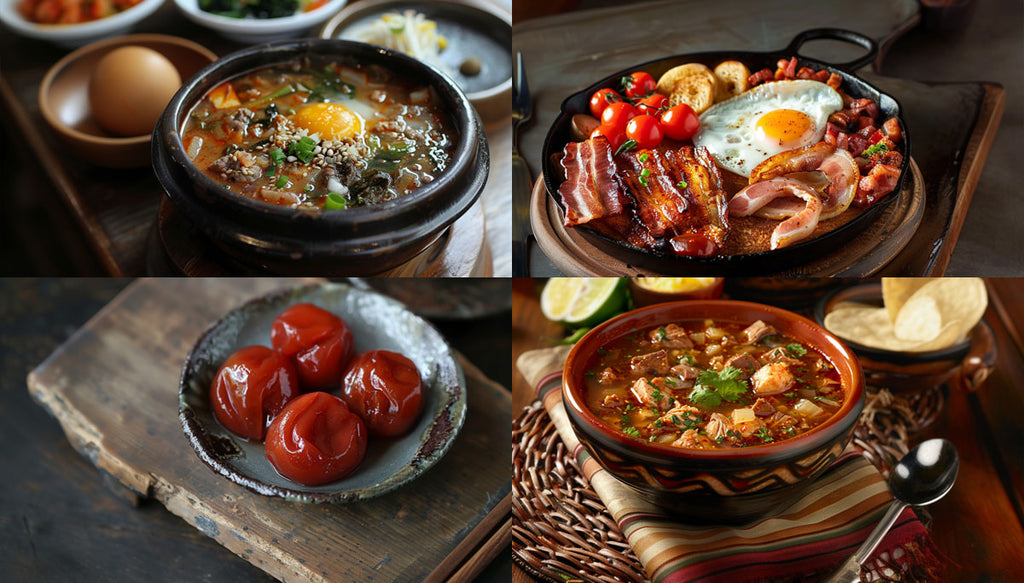Hangovers are a common experience across cultures, often resulting from a night of indulging in alcoholic beverages. While the symptoms of a hangover are universal – headache, nausea, fatigue, and more – the ways different cultures around the world handle hangovers can vary significantly. From hearty morning-after soups to sour plums and greasy breakfasts, each culture has its own unique remedies for dealing with the aftermath of a night of drinking.
South Korea's Haejangguk: A Hearty Morning-After Soup

In the vibrant streets of South Korea, locals turn to haejangguk as their go-to remedy after a night of revelry. This savory soup, whose name directly translates to "soup to chase a hangover," boasts a rich beef broth brimming with nourishing vegetables and a medley of spices. It's designed to combat the dreaded aftermath of alcohol consumption by replenishing lost nutrients and rehydrating the body. Often enjoyed as the first meal of the day following late-night festivities, haejangguk offers more than just its delicious taste. Its ingredients are carefully chosen to detoxify the body and alleviate headaches, making it a beloved tradition for those seeking relief. With each spoonful, the soup embodies a comforting embrace, providing not only physical replenishment but also a sense of cultural connection and well-being.
Japan's Umeboshi: The Power of Sour Plums
In the Land of the Rising Sun, the humble umeboshi takes center stage as a revered hangover remedy. These tart, pickled plums are an integral part of Japanese culinary tradition and are famed for their ability to counteract the effects of excessive alcohol consumption. Rich in citric acid, umeboshi work to stimulate digestion and rejuvenate the body by correcting imbalances and boosting energy levels. Traditionally, they are either consumed directly, added to a cup of hot tea, or placed atop a warm bowl of rice to mitigate hangover symptoms. The sourness of umeboshi is key to its effectiveness, as it prompts an increase in saliva production, thereby aiding in faster hydration and recovery. Praised for their natural detoxifying qualities, these plums also harbor antioxidants that are beneficial in flushing out toxins. Despite their puckering taste, many in Japan embrace umeboshi as a trusted ally after a night of indulgence. This practice underscores a broader cultural appreciation for natural, restorative foods and highlights umeboshi’s esteemed place in the pantheon of hangover cures.
The American Greasy Breakfast: Comfort Food or Cure-All?
Across the United States, the day after a lively night out is often met with a specific culinary tradition: the greasy breakfast. This heavy, hearty meal typically features staples such as bacon, eggs, sausages, pancakes, and toast. Favored for its soul-soothing qualities, this breakfast aims to battle hangover blues with a combination of fat, protein, and carbohydrates. The theory behind this approach is that greasy food can help soak up the remaining alcohol in the stomach, thereby easing hangover symptoms. Additionally, the substantial intake of calories provides a quick energy source, revitalizing the body after a night of depletion.
Despite the widespread acceptance of this remedy, its effectiveness is a topic of debate. While some individuals swear by the curative power of a greasy plate, others contend that it merely offers psychological comfort rather than a physiological antidote to hangovers. Nutritionists often point out that while such a meal might temporarily lift spirits and blood sugar levels, it doesn't necessarily address the root causes of hangover symptoms like dehydration and electrolyte imbalance.
The American greasy breakfast, therefore, stands as a cultural emblem of recovery and indulgence. Whether it serves as a genuine cure or merely a comforting ritual, it remains a testament to the country's unique approach to post-celebratory recuperation.
Mexico's Menudo: A Spicy Stomach Settler
In the heart of Mexico, when the revelry of the night gives way to the daylight's demands, many find solace in a bowl of menudo. This spicy soup, rich with tripe and hominy soaked in a red chili broth, is more than just a meal; it's a tradition steeped in healing and comfort. Believers in menudo's restorative powers value it for its ability to soothe the stomach and kick-start the recovery process after alcohol consumption. The key lies in its ingredients: the chili's capsaicin stimulates metabolism, aiding in the swift elimination of toxins, while the hominy and tripe provide essential nutrients and energy to a body in need. Not only is the broth believed to detoxify, but its warmth and spices are also thought to rejuvenate the spirit, offering both psychological and physiological relief to the sufferer. Menudo is typically enjoyed in communal settings, reflecting the social aspect of healing and the collective overcoming of discomfort. This cultural practice underscores the importance of shared remedies and the belief in food's power to not only nourish but also to mend. Amidst the varied global approaches to tackling hangovers, menudo stands out as a testament to Mexico's rich culinary heritage and its holistic view of wellness.
Germany's Katerfrühstück: Pickles and Herring for Breakfast
In Germany, combating the aftermath of a night spent indulging in spirits often leads to a unique and traditional remedy known as katerfrühstück. This "hangover breakfast" is a distinctive mix of flavors and ingredients, notably including tangy pickles, rich herring, and sharp onions, often accompanied by bread or potatoes. The rationale behind this unusual combination is its potential to replenish lost electrolytes and promote balance within the body. The salty and sour components are particularly praised for their ability to restore a sense of well-being by aiding hydration and soothing the stomach. This practice reflects not only an innovative approach to alleviating hangover symptoms but also a deep-rooted cultural appreciation for leveraging food as a form of healing. For many Germans, this meal is a staple in their morning-after recovery regimen, illustrating the country's unique culinary strategy in facing the universal challenge of hangovers.

